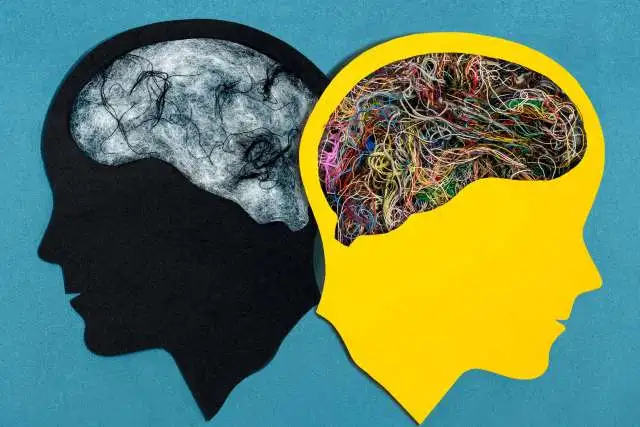Bipolar Disorder
Trusted Online Psychiatric Mental Health Clinic for Bipolar Disorder and other mental disorders in Flagstaff, AZ

Bipolar Disorder Specialist for Online Diagnosis and Treatment in Flagstaff, AZ
Bipolar disorder, also known as manic depressive illness, involves dramatic mood swings between depressive lows and manic highs. These mood fluctuations can significantly impact energy levels, behavior, and daily activities. However, with the right treatment, it is possible to effectively manage these challenges and stabilize mood.
At Foothills Psychiatry, our board-certified psychiatric mental health nurse practitioner, Simon George, and his team offer specialized online diagnosis and treatment for Bipolar Disorder in Flagstaff, AZ. We focus on stabilizing mood and thought patterns to help individuals achieve a more fulfilling and balanced life.
Offering Online consultations. To schedule a consultation, call our office.
Bipolar Disorder FAQ’s
What is Bipolar Disorder
The National Institute of Mental Health describes Bipolar Disorder, also known as manic-depressive illness, as a mental health condition marked by dramatic mood swings, fluctuations in energy levels, and alterations in behavior.
Bipolar disorder is categorized into three main types, each with its own pattern of mood, energy, and activity changes:
- Manic Episodes: Involve highly elevated, irritable, or excessively energetic behaviors.
- Depressive Episodes: Feature prolonged periods of sadness, apathy, or a sense of hopelessness.
- Hypomanic Episodes: Present as less intense variations of manic episodes
Individuals with bipolar disorder often find that these mood swings can disrupt their daily lives. While some mood variations are normal, persistent or worsening symptoms should be discussed with a healthcare provider. Foothills Psychiatry in Flagstaff, AZ offers online and telepsychiatry services to help manage and reduce the impact of bipolar disorder, aiming to improve overall mental health.
Bipolar disorder Symptoms?
Individuals with bipolar disorder experience phases of intense emotions, disrupted sleep patterns, and fluctuations in activity levels. Common symptoms include:
Symptoms of Bipolar Manic Episodes:
– Feeling capable of doing many things at once without getting tired
– Feeling important, talented, or powerful
– Racing thoughts
– Increased appetite for food, drinking, sex, or other pleasurable activities
– less need for sleep
– More active than usual
– Feeling very up, high, elated, or extremely irritable or touchy
Symptoms of Bipolar Depressive Episodes:
– Feeling unable to do easier things
– Feeling hopeless or worthless, even thinking about death or suicide
– Difficulty concentrating or making decisions
– Lack of interest in almost all activities
– Altered sleeping patterns
– Feeling slowed down or restless
– Feeling very sad, or anxious
If you or a loved one are experiencing symptoms of bipolar disorder, don’t panic—support is available. Foothills Psychiatry offers online diagnosis and therapy for bipolar disorder, allowing you to receive help from the comfort of your home. Call us to consult a bipolar specialist online in Flagstaff, AZ.
Bipolar Disorder Risk Factors
Research suggests that several factors may contribute to the development of bipolar disorder:
Family History and Genetics: Evidence indicates that certain genetic traits can increase the likelihood of developing bipolar disorder. Individuals with a family history of the condition, especially those with affected parents or siblings, are at a higher risk. It’s important to note that bipolar disorder involves multiple genes rather than a single genetic cause.
Brain structure and functioning: Studies have shown that the brains of individuals with bipolar disorder function differently compared to those without the condition. Based on diagnosis and test results, our mental healthcare experts in Flagstaff, Arizona, can create a tailored treatment plan and prescribe medications to help manage and stabilize the condition.
Traumatic Life Events: Trauma can influence bipolar disorder by triggering episodes, complicating treatment, increasing vulnerability, and causing frequent mood swings. Addressing these traumatic experiences can help your healthcare provider better understand your situation and offer more effective treatment options.
Substance Abuse: The regular use of drugs or alcohol can alter brain function and contribute to bipolar disorder. If you or someone you know experiences frequent and unusual mood swings, it’s important to seek help. Foothills Psychiatric Clinic in Flagstaff, AZ, offers online support and medication for both substance abuse and bipolar disorder. Contact our office to schedule an appointment and receive the help you need.
How is Bipolar Disorder Diagnosed
To determine if you are dealing with bipolar disorder, the team at Foothills Psychiatry in Flagstaff performs a thorough evaluation. This process involves discussing your thoughts, emotions, lifestyle habits, current medications, and medical history.
Additionally, our psychiatric healthcare professionals offer pharmacogenomic testing to identify the most effective medications for your condition. Based on this comprehensive assessment, we can develop and prescribe a personalized treatment plan tailored to your specific needs.
Bipolar Disorder Treatment and Medication
An effective treatment plan for Bipolar Disorder typically involves medication, psychotherapy (also known as talk therapy), or a combination of both. At Foothills Psychiatry, we can assist you in selecting the most appropriate treatment approach tailored to your needs:
a.) Medications for stabilizing Bipolar Disorder:
Medication management can be crucial in stabilizing mood fluctuations and addressing symptoms of bipolar disorder. Our team can prescribe mood stabilizers tailored to your specific needs based on a thorough evaluation of your current condition. After online consultation, and diagnosing bipolar disorder, we can either provide prescriptions during a visit or send them directly to your nearest pharmacy.
b.) Psychotherapy:
Psychotherapy, commonly known as talk therapy, is a valuable treatment for individuals with bipolar disorder. This approach utilizes various techniques to help individuals identify and change troubling emotions, thoughts, and behaviors. It provides support, education, and guidance not just for those with bipolar disorder, but also for their families.
Cognitive-behavioral therapy (CBT) is particularly effective for managing depression. It can be especially beneficial in addressing bipolar depression and insomnia, offering significant relief and support.
c. Other Positive Lifestyle Changes :
In the early stages of bipolar disorder, adopting healthy lifestyle habits can be highly effective in managing the condition. Embracing a nutritious diet, ensuring adequate rest, engaging in regular physical activity, and incorporating activities like travel can help lower stress levels and stabilize mental health. These positive changes can significantly contribute to improving overall well-being and managing bipolar symptoms.
For compassionate and effective bipolar disorder treatment in Flagstaff, AZ, contact Foothills Psychiatric Clinic. We are currently accepting new patients and provide online consultations/treatment via telepsychiatry. Call us at 480-608-4877 for more information and to schedule an appointment.














